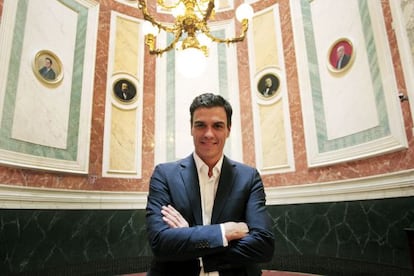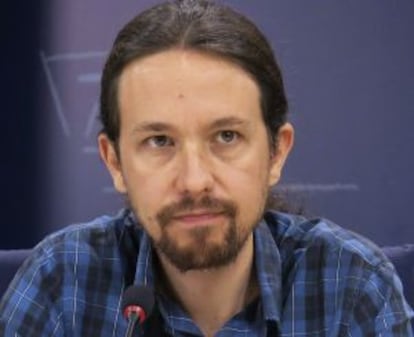Spain¡¯s new generation of leaders
They¡¯re media savvy, they¡¯re in touch with voters, and they¡¯re ready to shake up the political scene


In November 2011, Alberto Garz¨®n, who at the age of 28 had just been elected to Congress on behalf of the United Left coalition, came to Madrid to take part in state broadcaster TVE¡¯s debate slot 59 segundos, in which politicians are given one minute to answer a question from the public. Before his appearance, Garz¨®n, who was new to television, was briefed by Pablo Iglesias, then a university lecturer, today, the leader of Podemos (We Can), a left-leaning party created in March this year that won a surprising five seats in May¡¯s European elections.
Iglesias and Garz¨®n became friends. Garz¨®n would later appear on a political debate program on the Cadena SER radio network with Eduardo Madina, currently in the running to take over the leadership of the Socialist Party, who describes him as ¡°brilliant.¡± Pedro S¨¢nchez,?Madina¡¯s rival, has also appeared alongside Iglesias in debates, as has Albert Rivera, the leader of Catalan center-right grouping Ciutadans.
The four belong to the same generation, and despite ideological differences, share many views about politics and about how best to communicate those views. There are others of their generation, to the right of the political spectrum, such as 42-year-old Irene Lozano of UPyD and Borja S¨¦mper of the Popular Party (PP), although neither is in the running to take over their respective parties, as yet.
Tomorrow¡¯s leaders
PEDRO S?NCHEZ, 42. PhD in Economics. Former head of the cabinet of the UN's High Commissioner to Bosnia during the war in Kosovo. Lecturer at the Camilo Jos¨¦ Cela University in Madrid, and a former City Hall councilor.
ALBERTO GARZ?N, 28. MA in International Economics. Researcher at Seville and M¨¢laga Universities. He recently published the book Hay alternativas (There are alternatives). A former member of the Communist Youth, he was elected to Congress on behalf of United Left, and is seen as a possible future leader of the grouping.
EDUARDO MADINA, 38. MA in International Relations. Member of Congress since 2004 for the Socialist Party. Member of the executive committee since 2008. A former lecturer at the Carlos III University in Madrid, he was seriously injured in an ETA car bombing in 2002.
PABLO IGLESIAS, 35. BA in Law and Political Sciences. A former member of the Communist Youth. He finished his doctorate in 2008 and has published five books. He hosts La tuerka, a television debate program, and is a frequent guest on radio and television discussions. Now a member of the European Parliament.
ALBERT RIVERA, 34. MA in Law. Practicing lawyer since 2006, the same year he was elected leader of center-right grouping Ciutadans, which is opposed to Catalan independence. Now a member of the Catalan regional parliament. His proposal for a coalition with UPyD was rejected. Elected a member of the European Parliament in May.
IRENE LOZANO, 43. BA in Linguistics and Diploma in Philosophy from Birkbeck College, University of London. Journalist and columnist for El Mundo, El Pa¨ªs and Abc. Elected to Congress in 2011 on behalf of UPyD, but not in running for leadership.
They are well educated, media savvy, and have avoided playing the same blame-game approach to politics as their elders. The European elections, which produced surprises such as the appearance of Podemos, seem to have marked a watershed in Spanish politics. The Socialist Party and the United Left have begun a renewal process that will see veterans such as Alfredo P¨¦rez Rubalcaba (about to celebrate his 63rd birthday) and Cayo Lara (62) respectively step down. The abdication of King Juan Carlos after almost four decades on the throne has deepened the feeling of a generational handover.
By the time of next year¡¯s general election the leader of the Socialist Party will be in their forties, whether it is Madina, S¨¢nchez, former defense minister Carme Chac¨®n, or even Andalusian premier Susana D¨ªaz; while the United Left will likely be led by Garz¨®n, with 35-year-old Iglesias at the helm of Podemos, and Rivera, aged 34, heading Ciutadans.
There is no sign that the PP¡¯s Mariano Rajoy, who will be 60 next year, will stand down before then, while UPyD is a young party with an ageing leader: Rosa D¨ªez is 62. Will either party suffer as a result?
¡°I was one year old one when Rajoy took his seat in Congress,¡± says Alberto Garz¨®n. ¡°When things are difficult, people look for something new and somebody new. This might explain why so many people voted for Podemos, even though it is made up mainly of young people. But the generation thing is relative; the most important thing is that things change deep down.¡±
¡°There is an old time that has gone, and a new time that is arriving,¡± says Madina. ¡°Another generation is taking over, even as head of state. The crisis has been very destructive, and it is logical that voters demand something new. This is not the first time this has happened in the recent history of Spain. The generation of Felipe Gonz¨¢lez emerged when they were in their late twenties, as did that of Aznar, and Zapatero. Society is demanding profound change, and the generations that have been in power are paying the price for this. But a generational handover is not a magic answer, it won¡¯t sort out all the problems. There has to be real change, deep down.¡±
¡°People are hungry for new faces,¡± says Pedro S¨¢nchez. ¡°But we need an alliance between the generations. We are on the verge of a big change to the political system, there are going to be constitutional reforms, the way parties function will change, and this requires a new generation.¡±
But Susana D¨ªaz, the 40-year-old head of the regional government of Andalusia, says that age is not the only factor in implementing change. ¡°Spain has a major crisis every 40 years, and we are in the midst of it. We need real change, we need new people prepared to set an example, to go about things differently, to take a new approach. Voters do not want cardboard cutout politicians.¡±

Pablo Iglesias also recognizes common goals among the new generation of politicians. ¡°Garz¨®n and I are aware that the United Left and Podemos are both working toward change. I think that the United Left has done the right thing by holding open primaries and using its best communicators to speak on its behalf. The new generation understands better than its mentors the keys of political communication. It is clear that the electorate prefers spokespeople who know how to communicate and who have not been professional politicians all their lives. But political change is about more than just electing young people. I have never worked with Madina, but he gives me the impression that he is an honest person, S¨¢nchez seems more conventional.¡±
Given Rajoy¡¯s age, there is little appetite in the PP to talk openly about whether a new generation can get Spain out of the mess it is in. Most party members, from local activists to cabinet ministers, believe that Rajoy has experience and stability on his side, and this is what he will base his campaign on; that and signs of economic recovery that will justify his austerity policies.
PP secretary general Mar¨ªa Dolores de Cospedal, who is 50 next year, rejects the idea that youth holds any inherent electoral value. ¡°The Socialist Party is going to elect a new leader, but is it going to restructure the whole organization? Because there are plenty of regional leaders who have been in the party all their lives.
¡°There has been a deep-rooted renewal in the PP in recent years, but I don¡¯t accept the idea that age is what matters: so experience counts for nothing? When I have had to put together teams, I have always looked for a combination of ages,¡± she says.
After 35 years of transition, the time has come for the generation born into democracy to lead the country¡± Albert Rivera, Ciutadans
Nobody in the PP is suggesting that an incumbent prime minister who won an absolute majority stand down in favor of Cospedal or deputy premier Soraya S¨¢enz de Santamar¨ªa. ¡°It is not up for discussion in the PP. There are people in the party who get very nervous about this idea of generational change, but Rajoy¡¯s profile is just right for the times we are living through. It¡¯s pretty obvious what the tenor of the election campaign is going to be: certainty versus radicalism, stability versus a coalition of the left,¡± says a veteran figure in the party.
¡°Nobody stands down when they are in power. Any renewal in the PP will take place if Rajoy loses in 2015, and if not, then in 2019. But it will be after elections, not before,¡± says another long-standing former cabinet minister.
¡°The transition from dictatorship to democracy was a success because it was carried out by people who had not been involved in the Civil War, with the exception of Santiago Carillo,¡± says Jos¨¦ Antonio Gri?¨¢n, who last year, at the age of 68, stood down amid a corruption scandal affecting his government.
¡°We are in the middle of a similar constituent process. In Andalusia, we have started down this road and little by little it is extending. The PP is in government and it¡¯s more difficult, unless you decide to step down, like I did. But it has Santamar¨ªa and Cospedal, and in Andalusia, Juanma Moreno, who belongs to the same generation. The handover is ready. What¡¯s more, this generation isn¡¯t afraid like we were, particularly when it comes to dealing with issues like the regions.¡±
I don¡¯t think being 30 automatically makes you a more innovative person than somebody aged 60¡± Irene Lozano, UPyD
¡°There is no alternative to Rajoy,¡± says a senior regional PP leader. ¡°That¡¯s not our problem. We don¡¯t take part in debate, we have left that space, we¡¯re always catching up. I am not as pessimistic as others about next year¡¯s elections, but we will have to change and get our skates on. Our voters are increasingly abstaining.¡±
But it looks as though the PP will be returning to the fray after the summer, and will be raising its media profile after months of silence in the wake of the scandals of the past year. That said, neither Rajoy or Santamar¨ªa have ever seen the need for interviews with the media. For the moment, only Borja S¨¦mper, the peer of S¨¢nchez et al, is prepared to be the public face of the party.
¡°I think there is a new political language,¡± says S¨¦mper. ¡°Despite the huge ideological differences there is something in common between people of different parties. We are all tired of the blame-game approach: politicians and voters. We want to talk about content, we want a real discussion based on ideas. We are all active on the social networks, and we all know that today, more than ever, you need to be in touch with as many people as possible who think like you do.¡±
Irene Lozano, 42, elected to Congress in 2011 for UPyD, is also a regular on radio and television debates, arguing in favor of a new approach to politics. ¡°We have finally shrugged off the dead weight of the two-party, PP-Socialist dynasty, and are beginning to discuss important issues. But I don¡¯t think that being 30 automatically makes you a more innovative person than somebody aged 60.To say that Rosa D¨ªez and Rajoy are the same because they belong to the same generation is absurd, because they are absolute opposites, and have very different approaches to politics. UPyD¡¯s primaries have always been open.¡±
Spain¡¯s new generation of politicians have other things in common, says Madina: ¡°Most of us speak foreign languages, we have lived outside Spain, and we have worked in fields other than politics. We were born into a Spain that was developing fast, and we understand that this is temporary, we all agree that there should be a limit on the amount of time politicians spend in office.¡±
Albert Rivera, the other figure to have emerged via the European elections in May thanks to the success of Ciutadans, describes what he calls an ¡°unstoppable generational change.¡± ¡°After 35 years of transition, the time has come for the generation born into democracy to take over the leadership of the country. But it¡¯s not just about youth, it¡¯s about attitude, and courage. There are parties that will put young people forward and keep the same attitudes. What really needs to change is the structure of the parties, but there are young people who toe the line, who have never spoken out,¡± says Rivera.
Tu suscripci¨®n se est¨¢ usando en otro dispositivo
?Quieres a?adir otro usuario a tu suscripci¨®n?
Si contin¨²as leyendo en este dispositivo, no se podr¨¢ leer en el otro.
FlechaTu suscripci¨®n se est¨¢ usando en otro dispositivo y solo puedes acceder a EL PA?S desde un dispositivo a la vez.
Si quieres compartir tu cuenta, cambia tu suscripci¨®n a la modalidad Premium, as¨ª podr¨¢s a?adir otro usuario. Cada uno acceder¨¢ con su propia cuenta de email, lo que os permitir¨¢ personalizar vuestra experiencia en EL PA?S.
?Tienes una suscripci¨®n de empresa? Accede aqu¨ª para contratar m¨¢s cuentas.
En el caso de no saber qui¨¦n est¨¢ usando tu cuenta, te recomendamos cambiar tu contrase?a aqu¨ª.
Si decides continuar compartiendo tu cuenta, este mensaje se mostrar¨¢ en tu dispositivo y en el de la otra persona que est¨¢ usando tu cuenta de forma indefinida, afectando a tu experiencia de lectura. Puedes consultar aqu¨ª los t¨¦rminos y condiciones de la suscripci¨®n digital.








































